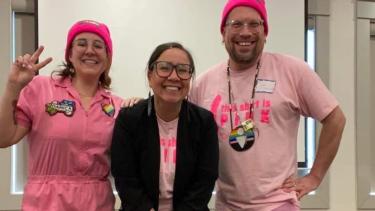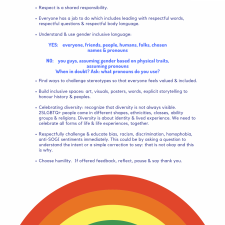Brave & Safe Spaces

In the work of Indigenization and Reconciliation there are many intersecting aspects that we all work within and therefore, we need to continue to build up our understanding, together. The District Aboriginal Team is committed and dedicated to working within these many intersections, including diversity, equity, anti-racism, inclusion, and SOGI Awareness.
Here are some term and definitions from the SD8 SOGI Policy:
- SOGI – (Sexual Orientation & Gender Identity) SOGI provides an opportunity to bring awareness to all sexualities and genders. 2SLGBTQQIA+ peoples, voices, experiences, and stories included in schools creates space for them to be represented, supported, celebrated, and welcomed. Learn more about SOGI.
- Two Spirit – The term was brought to life by Dr. Myra Laramee (Cree) at a gathering of Indigenous LGBTQQIA+ Indigenous peoples in 1990. It is meant to be a term that invoked the many sexualities and genders that have always been present on these Lands. “When Two-Spirit is used, it invokes our sacredness and reminds us that we have always been here and we will always be here. As a result, with Two-spirit comes a great responsibility, to those who use it, as we walk and work in a sacred way with and for our people.” The term is complex and those who use it hold different meaning for it. Nations hold their own words and meanings for this term and it is important to note that not all Indigenous LGBTQQIA+ people identify as Two Spirit, but all Two Spirit people are Indigenous.
- Queer – This is a term that was once used as a derogatory word to describe 2SLGBTQQIA+ people. Some community members still hold it as a hurtful word, and some members are working to reclaim it as a word to describe themselves.
- Indigiqueer – This term was coined by TJ Cuthand and reflects that some LGBTQQIA+ Indigenous Peoples don’t feel as comfortable with the term Two Spirit to reflect their sexual orientation and/or gender identity.
We recognise that through the impacts of colonization, the voices and experiences of 2SLGBTQQIA+ Indigenous Peoples have been oppressed. We strive to hold space for the stories 2SLGBTQQIA+ Indigenous Peoples to be told, for their voices to be heard, for their lives to be celebrated, and for their bodies to be present at learning spaces and places.
In this light, we hold 2SLGBTQQIA+ Indigenous Peoples in our hearts as we share “Tips to Create Brave & Safe Spaces”.


